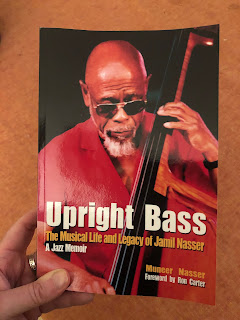My summer reading this year has included two fascinating books: both of them ostensibly about bass players, but actually they narrate more about the determination and self-determination that transfers across all our lives.
The first book - Upright Bass: the musical life and legacy of Jamil Nasser - was introduced to me in March by Muneer Nasser, the author, when he joined me for an episode of my podcast, Harmonious World. Muneer and I discussed the book, as well as the music of his father, Jamil, and his own releases. Once I started reading Upright Bass, I couldn't put it down.
Nasser drops names about the extraordinary musicians his father worked with, and alongside that he tells the story of an incredible life behind many great jazz gigs and recordings.
As well as the musical legacy, Jamil Nasser, who died on 13 February 2010, will be remembered for speaking up against injustice and this book expands on the way he used his voice as a power for good. At his memorial, jazz pianist and composer Harold Mabern said: "Jamie was a giver, not a taker, a man of high integrity and an organiser who didn't waste time."
Upright Bass is about so much more than the life and times of a musician. It is well worth a read for anyone interested in the ways of bop and the trials of being a jazz musician. Buy the book here and find out more about the music and the works of Muneer Nasser here.




Comments
Post a Comment